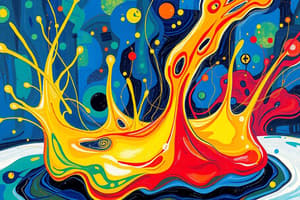Podcast
Questions and Answers
What is the freezing point defined as?
What is the freezing point defined as?
- The temperature at which a liquid turns into a gas
- The temperature below which a liquid turns into a solid (correct)
- The temperature at which a gas condenses into a liquid
- The temperature at which a solid begins to melt
Which statement about the freezing point is correct?
Which statement about the freezing point is correct?
- It is always the same as the melting point of a substance
- It is independent of the substance's chemical properties
- It varies depending on the pressure exerted on the substance (correct)
- It is always higher than the boiling point of a substance
What happens when a liquid reaches its freezing point?
What happens when a liquid reaches its freezing point?
- It transforms into a gas
- It begins to evaporate
- It remains in a liquid state indefinitely
- It turns into a solid (correct)
Which of the following is an example of a freezing point?
Which of the following is an example of a freezing point?
Which factor does not affect the freezing point of a liquid?
Which factor does not affect the freezing point of a liquid?
Flashcards
Freezing Point
Freezing Point
The temperature at which a liquid transforms into a solid state.
Pressure Affects Freezing Point
Pressure Affects Freezing Point
The freezing point changes based on pressure applied to the substance.
Liquid to Solid
Liquid to Solid
When a liquid reaches this specific temperature, its state changes from liquid to solid.
Example of Freezing Point
Example of Freezing Point
Signup and view all the flashcards
Unaffacted by Initial Temperature
Unaffacted by Initial Temperature
Signup and view all the flashcards
Study Notes
Freezing Point Definition
- The freezing point is the temperature at which a liquid transforms into a solid.
- For pure substances, the freezing point is equal to the melting point.
Correct Statements about the Freezing Point
- The freezing point can vary based on pressure and the presence of impurities.
- The freezing point is a characteristic property of substances, allowing for identification.
Behavior at Freezing Point
- When a liquid reaches its freezing point, molecular motion slows down significantly.
- Energy in the form of heat is released during the freezing process, causing particles to bond and form a solid.
Examples of Freezing Points
- Water has a freezing point of 0°C (32°F) under standard atmospheric pressure.
- Different substances have distinct freezing points, such as ethanol at -114.1°C (-173.4°F).
Factors Affecting Freezing Point
- Factors that affect the freezing point include pressure, molecular structure, and the presence of solutes.
- The freezing point of a liquid is not influenced by the quantity of the liquid present.
Studying That Suits You
Use AI to generate personalized quizzes and flashcards to suit your learning preferences.




